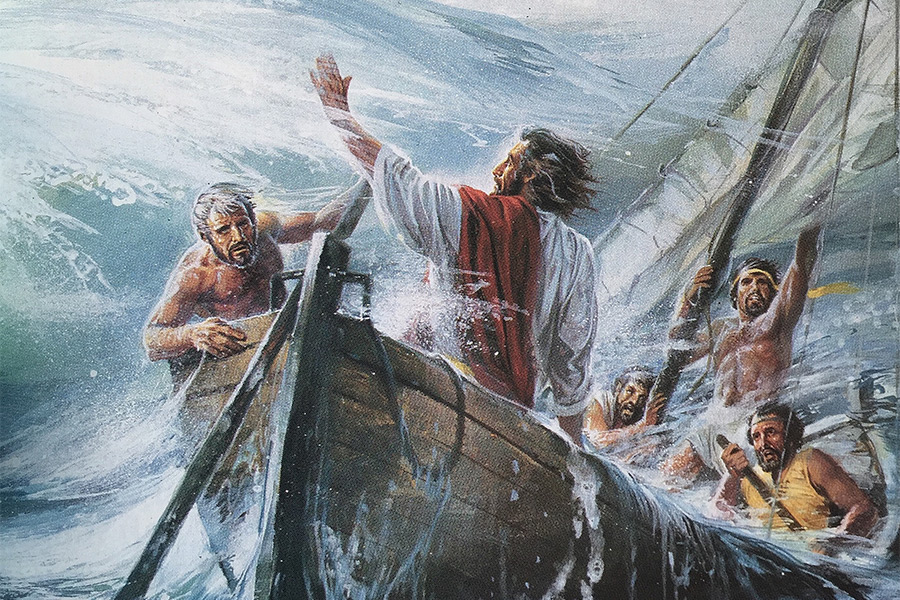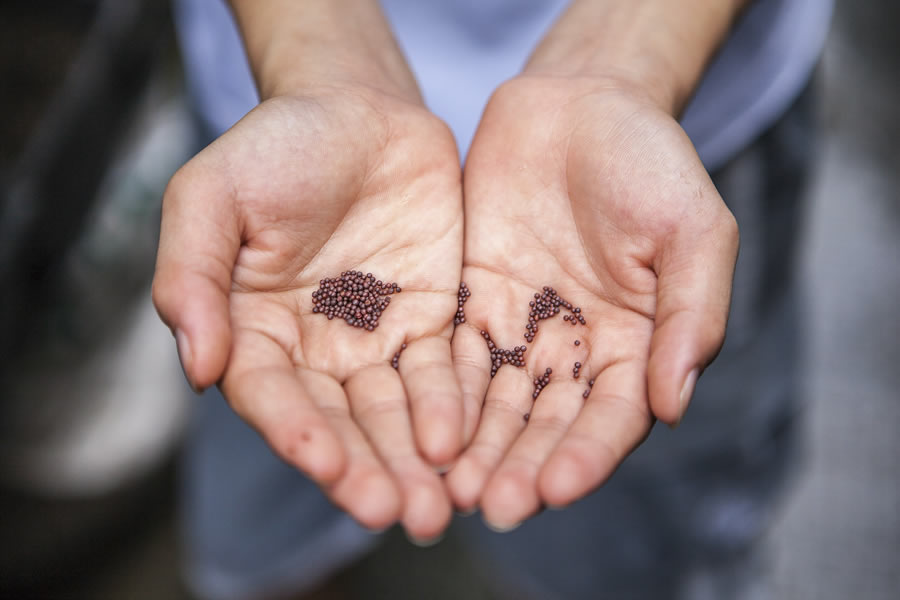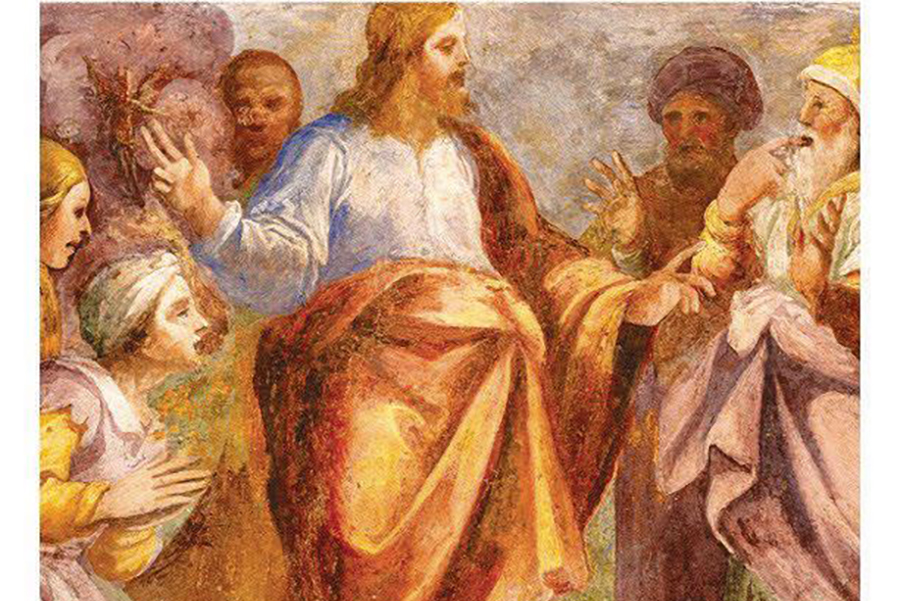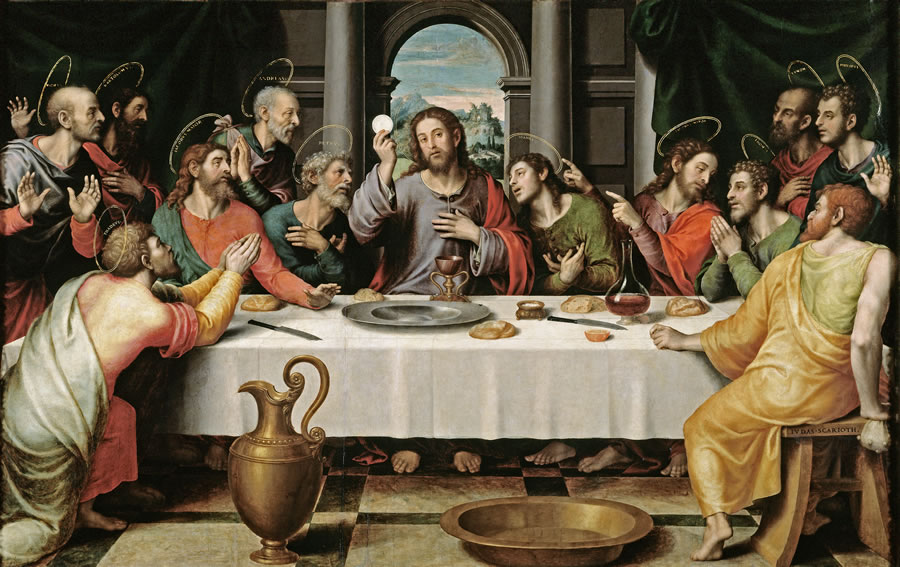St. Francis of Assisi Weekly Reflections

Just Have Faith
06-30-2024Weekly ReflectionWe Celebrate Worship Resource, Vol. 49, No. 1God is good. God is love. God is life. These are fundamental truths of our faith. We are reminded in the first reading that we are created in God’s image. Therefore, we are created to be good always, to love one another, and to live forever. However, because of original sin, we must rely on God’s mercy for all three. We strive to be good always, and to repent and seek forgiveness when we aren’t. We are challenged to love God and to love our neighbor. We hope to live eternally with God. This is what our faith calls us to do. In the Gospel, we meet two people with strong faith: a woman with hemorrhages and Jairus, a religious official whose daughter is near death. Each of them seeks out Jesus and his healing touch. They are rewarded specifically for their faith. “Your faith has saved you,” he tells Jairus (5:36). Our faith can save us as well, drawing us to God, our ultimate source of goodness, love, and life.
How does your faith influence the way you regard goodness, love, and life?
Basta Que Tengas Fe
Dios es bueno. Dios es amor. Dios es vida. Estas son verdades fundamentales de nuestra fe. En la primera lectura se nos recuerda que somos creados a imagen de Dios. Por lo tanto, fuimos creados para ser buenos siempre, para amarnos unos a otros y para vivir para siempre. Sin embargo, debido al pecado original, debemos confiar en la misericordia de Dios para los tres. Nos esforzamos por ser buenos siempre y por arrepentirnos y buscar el perdón cuando no lo somos. Tenemos el desafío de amar a Dios y amar a nuestro prójimo. Esperamos vivir eternamente con Dios. Esto es lo que nuestra fe nos llama a hacer. En el Evangelio encontramos a dos personas con una fe fuerte: una mujer con hemorragias y Jairo, un funcionario religioso cuya hija está al borde de la muerte. Cada uno de ellos busca a Jesús y su toque sanador. Son recompensados específicamente por su fe. “Tu fe te ha salvado”, le dice a Jairo (5:36). Nuestra fe también puede salvarnos a nosotros, atrayéndonos a Dios, nuestra fuente suprema de bondad, amor y vida.
¿Cómo encuentras refugio en tu fe en momentos de ansiedad o pérdida?
Rich in Love
06-30-2024Question of the WeekReading I: Wisdom 1:13-15; 2:23-24 - God’s Justice and Its Rejection by the Wicked
Reading II: 2 Corinthians 8:7, 9, 13-15 - Liberal Giving
Gospel: Mark 5:21-43 or 5:21-24, 35-43 - The Daughter of Jairus; The Woman With a Hemorrhage
Key Passage: For you know the generous act of our Lord Jesus Christ, that though he was rich, yet for your sakes he became poor, so that by his poverty you might become rich. (2 Corinthians 8:9)
Adults: When have you felt enriched by a sacrifice you made for another?
Kids: Whom could you help by your acts of kindness this week?
Rico En Amor
Lectura I: Sabiduría 1:13-15; 2:23-24 - La justicia de Dios y su rechazo por parte de los impíos
Lectura II: 2 Corintios 8:7, 9, 13-15 - Liberal dando
Evangelio: Marcos 5:21-43 o 5:21-24, 35-43 - La hija de Jairo; La mujer con una hemorragia
Pasaje Clave: Porque conocéis la generosidad de nuestro Señor Jesucristo, que, aunque era rico, por amor a nosotros se hizo pobre, para que nosotros con su pobreza nos enriquecieramos. (2 Corintios 8:9)
Adultos: ¿Cuándo te has sentido enriquecido por un sacrificio que hiciste por otro?
Niños: ¿A quién podrías ayudar con tus actos de bondad esta semana?

Do You Have Faith?
06-23-2024Weekly ReflectionWe Celebrate Worship Resource, Vol. 49, No. 1After Jesus calms the storm in today’s Gospel, he asks his terrified disciples, “Do you not yet have faith?” (Mark 4:40). This question is very important for Mark, for he was trying to guide his Gentile audience to faith in the Lord amid Roman persecution. Therefore, he is sure to emphasize how the disciples’ faith only gradually overcame their fears. Recall that when the disciples first encountered Jesus, it was a calm, pleasant day by the Sea of Galilee, where they left everything behind to follow him. But now, during a frightening storm with their very lives in danger, their faith wavered. Their strong fear drove out their untested faith. But Jesus’ power over the storm, like God’s assurance to Job in the first reading, provides an opportunity for their faith in him to overcome their fear of the storm. Our faith is similarly tested by the storms in our lives. We too may feel as if Jesus is sleeping through our trials and hardships. But he remains with us always. He asks us to turn to him in our hour of need, to look to our faith to calm our fears.
How do you find refuge in your faith in times of anxiety or loss?
¿Y Tu, Tienes Fe?
Después de que Jesús calma la tormenta en el Evangelio de hoy, pregunta a sus aterrorizados discípulos: “¿Aún no tenéis fe?” (Marcos 4:40). Esta pregunta es muy importante para Marcos, porque estaba tratando de guiar a su audiencia Gentil a la fe en el Señor en medio de la persecución romana. Por lo tanto, seguramente enfatizará cómo la fe de los discípulos solo superó gradualmente sus temores. Recuerde que cuando los discípulos encontraron a Jesús por primera vez, era un día tranquilo y agradable en el Mar de Galilea, donde dejaron todo para seguirlo. Pero ahora, durante una tormenta aterradora con sus vidas en peligro, su fe flaqueó. Su fuerte temor ahuyentó su fe no probada. Pero el poder de Jesús sobre la tormenta, como la seguridad que Dios le dio a Job en la primera lectura, brinda una oportunidad para que su fe en Él supere su miedo a la tormenta. Nuestra fe es igualmente puesta a prueba por las tormentas en nuestras vidas. Nosotros también podemos sentir como si Jesús estuviera durmiendo durante nuestras pruebas y dificultades. Pero él permanece con nosotros siempre. Nos pide que recurramos a Él en nuestra hora de necesidad, que recurramos a nuestra fe para calmar nuestros miedos.
¿Cómo encuentras refugio en tu fe en momentos de ansiedad o pérdida?
Gift of Peace
06-23-2024Question of the WeekReading I: Job 38:1, 8-11 - The Lord’s Speech to Job
Reading II: 2 Corinthians 5:14-17 - The Ministry of Reconciliation
Gospel: Mark 4:35-41 - The Storm on the Sea
Key Passage: Jesus said to the sea, “Peace! Be still!” Then the wind ceased, and there was a dead calm. He said to them, “Why are you afraid? Have you still no faith?” (Mark 4:39–40)
Adults: When has the Lord calmed the stormy seas of your life?
Kids: What fear would you like the Lord to help you overcome?
El Don De Paz
Lectura I: Job 38:1, 8-11 - El discurso del Señor a Job
Lectura II: 2 Corintios 5:14-17 - El Ministerio de Reconciliación
Evangelio: Marcos 4:35-41 - La Tormenta en el Mar
Pasaje Clave: Y levantándose, reprendió al viento, y dijo al mar: Calla, enmudece. Y cesó el viento, y se hizo grande bonanza.Y les dijo: ¿Por qué estáis así amedrentados? ¿Cómo no tenéis fe? (Marcos 4:39–40)
Adultos: ¿Cuándo el Señor ha calmado los mares tormentosos de tu vida?
Niños: ¿Qué temor te gustaría que el Señor te ayudara a superar?

Seed Grow Of Itself
06-16-2024Weekly ReflectionWe Celebrate Worship Resource, Vol. 49, No. 1It’s really amazing that we’re able to walk around with what amounts to a small computer in our pockets. If we need an answer, from who won last year’s Super Bowl to what nearby restaurant makes the best lasagna, we merely need to pull out our phoned and ask. But what about the big questions, like “Is this really love?” or “what is the meaning of life?” Paul’s advice to “walk by faith, not by sight” is sound (2Corinthians 5:7). After all, human knowledge is imperfect. In the parables we hear today, Jesus uses the example of seeds. We can’t see a mustard seed spit open under the soil and germinate. Nor can we see the inner working of a plant, which grows taller and sturdier and eventually produces fruit. Similarly, we can’t see the seeds of faith growing inside us, slowly leading us toward the kingdom of God. Yet we believe it is happening. We believe that we are part of it. And we believe that the kingdom that continues to grow each day is greater than all the smartphones in the world, and that one day we will all dwell in its branches, in God’s presence.
How have you sensed the seed of faith growing within yourself? What can you do this week to nurture your own seed of faith or another’s?
La Semilla Crece Por Sí Sola
Es realmente sorprendente que podamos caminar con lo que equivale a una pequeña computadora en nuestros bolsillos. Si necesitamos una respuesta, desde quién ganó el Super Bowl del año pasado hasta qué restaurante cercano hace la mejor lasaña, simplemente tenemos que sacar nuestro teléfono y preguntar. Pero ¿qué pasa con las grandes preguntas como “¿Es esto realmente amor?” o "¿cuál es el significado de la vida?" El consejo de Pablo de “andar por fe, no por vista” es acertado (2 Corintios 5:7). Después de todo, el conocimiento humano es imperfecto. En las parábolas que escuchamos hoy, Jesús usa el ejemplo de las semillas. No podemos ver una semilla de mostaza abierta bajo la tierra y germinar. Tampoco podemos ver el funcionamiento interno de una planta, que crece más alta y más robusta y eventualmente produce frutos. De manera similar, no podemos ver las semillas de la fe creciendo dentro de nosotros, conduciéndonos lentamente hacia el reino de Dios. Sin embargo, creemos que está sucediendo. Creemos que somos parte de ello. Y creemos que el reino que sigue surgiendo cada día es más grande que todos los teléfonos inteligentes del mundo, y que un día todos habitaremos en sus ramas, en la presencia de Dios.
¿Cómo has sentido que la semilla de la fe crece dentro de ti? ¿Qué puedes hacer esta semana para nutrir tu semilla de fe ganada o la de otros?
Living In God’s Kingdom
06-16-2024Question of the WeekReading I: Ezekiel 17:22-24 - Prophecy of the Restoration of Israel
Reading II: 2 Corinthians 5:6-10 - Walking by Faith
Gospel: Mark 4:26-34 - Seed Grows by Itself and the Mustard Seed
Key Passage: Yet when [the mustard seed] is sown it grows up and becomes the greatest of all shrubs, and puts forth large branches, so that the birds of the air can make nests in its shade. (Mark 4:32)
Adults: What is the “good soil” that has allowed your faith to grow like the mustard seed and provide shelter for others?
Kids: How do you help your faith grow like the mustard seed?
Vivir En El Reino De Dios
Lectura I: Ezequiel 17:22-24 - Profecía de la Restauración de Israel
Lectura II: 2 Corintios 5:6-10 - Caminando por la fe
Evangelio: Marcos 4:26-34 - La semilla crece por sí sola y la semilla de mostaza
Pasaje Clave: Sin embargo, cuando [la semilla de mostaza] se siembra, crece y se convierte en el mayor de todos los arbustos, y echa grandes ramas, de modo que las aves del cielo pueden hacer nidos a su sombra. (Marcos 4:32)
Adultos: ¿Cuál es la “buena tierra” que ha permitido que su fe crezca como la semilla de mostaza y brinde refugio a otros?
Niños: ¿Cómo ayudas a que tu fe crezca como la semilla de mostaza?
Love For All
06-09-2024Question of the WeekReading I: Gen 3:9-15 - The Fall
Reading II: 2 Cor 4:13-5:1 - Paradox of the Ministry
Gospel: Mark 3:20-35 - Jesus and Beelzebul; Jesus and His Family
Key Passage: Jesus said, “Whoever does the will of God is my brother and sister and mother.” (Mark 3:35)
Adults: In what way could you widen the circle of your family to include someone in need?
Kids: Whom could you invite to share a happy time with your family?
Amor Para Todos
Lectura I: Génesis 3:9-15 - La Caída
Lectura II: 2 Cor 4:13-5:1 - Paradoja del Ministerio
Evangelio: Marcos 3:20-35 - Jesús y Beelzebú; Jesús y Su familia
Pasaje Clave: Jesús dijo: “El que hace la voluntad de Dios ése es mi hermano, mi hermana y mi madre”. (Marcos 3:35)
Adultos: ¿De qué manera podrían ampliar el círculo de su familia para incluir a alguien necesitado?
Niños: ¿A quién podrías invitar a compartir un momento feliz con tu familia?

God’s Will
06-09-2024Weekly ReflectionWe Celebrate Worship Resource, Vol. 49, No. 1What do we do when we get caught doing something we know we shouldn’t? Do we accept responsibility and promise to do better? Or do we find someone else, anyone else, to blame? Both Adam and Eve choose the latter. Adam blames “the woman whom you were put here with me,” managing to blame both Eve and God in one excuse (Genesis 3:12). Eve blames the “tricky” serpent. Neither takes responsibility for their own sinfulness. What’s more, they drive a wedge between each other and between themselves and God. This is what happens when we blame someone else, even if they did play a role in it, like the serpent. We divide ourselves from whomever we’ve blamed. To paraphrase Jesus in the Gospel, when we divide ourselves from each other, we fall. Instead, we are called to take responsibility for what we’ve done and to reconcile with whomever we’ve wronged. Note that at the end of this passage Jesus says, “whoever does the will of God is my brother and sister and mother” (Mark 3:35). To be united with Jesus and the Christian family, do God’s will. Start with loving—not blaming—your neighbor.
When do you tend to blame someone else instead of taking responsibility yourself? How can you reconcile with your neighbor and God?
La Voluntad De Dios
¿Qué hacemos cuando nos pillan haciendo algo que sabemos que no deberíamos? ¿Aceptamos la responsabilidad y prometemos no volver a hacerlo? ¿O encontramos a alguien a quien culpar? Tanto Adán como Eva eligen lo último. Adán culpa a “la mujer que me diste como compañera”, logrando culpar tanto a Eva como a Dios con una sola excusa (Génesis 3:12). Eva culpa a la serpiente “astuta”. Ninguno de los dos se hace responsable de su propia pecaminosidad. Es más, abren una brecha entre ellos y entre ellos y Dios. Esto es lo que sucede cuando culpamos a alguien más, incluso si jugó un papel en ello, como la serpiente. Nos separamos de quienes hemos culpado. Parafraseando a Jesús en el Evangelio, cuando nos separamos unos de otros, caemos. En cambio, estamos llamados a asumir la responsabilidad de lo que hemos hecho y a reconciliarnos con quienes hemos hecho daño. Tenga en cuenta que al final de este pasaje Jesús dice: “Todo aquel que hace la voluntad de Dios ése es mi hermano, mi hermana y mi madre” (Marcos 3:35). Para estar unidos a Jesús y a la familia cristiana, hacer la voluntad de Dios. Empiece por amar, no culpar, a su prójimo.
¿Cuándo tiendes a culpar a otra persona en lugar de responsabilizarte tú mismo? ¿Cómo puedes reconciliarte con tu prójimo y con Dios?

This Is My Blood Of The Covenant
06-02-2024Weekly ReflectionWe Celebrate Worship Resource, Vol. 49, No. 1We may think of the Eucharist that we celebrate today as going back almost two thousand years, and this is true, but its origins go back even further. As we hear in the first reading today, the Chosen People gathered around Moses, listened to him read God’s word aloud, then shared in the blood of the covenant. The animals were young and unblemished (hence, regarded as innocent) and their blood was considered to be their life force. Sacrificing these animals and sharing their blood bound the people to their God with their force of life. Jesus’ disciples would have recalled this ancient ritual when they gathered for the Passover, when he transformed this ritual by sharing the cup of wine, calling it his own blood. He became the innocent lamb who would go on to sacrifice himself in order to bring eternal life to all who shared in this ritual, this ritual we hear described in the Gospel, this ritual that we participate in today. To use the words of each Eucharistic Prayer, may “the blood of the new and eternal covenant,” poured out for us for our salvation, bind us ever more closely in love, in service, and in life to the Lord.
How does receiving Jesus’ body and blood in the Eucharist bind you to the covenant established in baptism?
Esta Es Mi Sangre De La Alianza
Podemos pensar que la Eucaristía que celebramos hoy se remonta a casi dos mil años atrás, y esto es cierto, pero sus orígenes se remontan aún más atrás. Como escuchamos en la primera lectura de hoy, el Pueblo Elegido se reunió alrededor de Moisés, lo escuchó leer la palabra de Dios en voz alta y luego compartió la sangre del pacto. Los animales eran jóvenes e inmaculados (por lo tanto, se los consideraba inocentes) y se consideraba que su sangre era su fuerza vital. Sacrificar estos animales y compartir su sangre unía al pueblo a su Dios con su fuerza vital. Los discípulos de Jesús habrían recordado este antiguo ritual cuando se reunieron para la Pascua, cuando Él transformó este ritual compartiendo la copa de vino, llamándola su propia sangre. Se convirtió en el cordero inocente que se sacrificaría para traer vida eterna a todos los que compartieran este ritual, este ritual que escuchamos descrito en el Evangelio, este ritual en el que participamos hoy. Para usar las palabras de cada Plegaria Eucarística, que “la sangre de la nueva y eterna alianza”, derramada por nosotros para nuestra salvación, nos una cada vez más estrechamente en amor, en el servicio y en la vida al Señor.
¿Cómo te vincula el recibir el cuerpo y la sangre de Jesús en la Eucaristía al pacto establecido en el bautismo?
Bread for Others
06-02-2024Question of the WeekReading I: Exodus 24:3-8 - Ratification of the Covenant
Reading II: Hebrews 9:11-15 - The Sacrifice of Jesus
Gospel: Mark 14:12-16, 22-26 - Passover Preparation
Key Passage: While they were eating, he took a loaf of bread, and after blessing it he broke it, gave it to them, and said, “Take; this is my body.” (Mark 14:22)
Adults: In what ways have you practiced the words of Jesus and been bread for others?
Kids: What can you do to prepare to celebrate Holy Communion with your parish family?
Pan Para Los Demas
Lectura I: Éxodo 24:3-8 - Ratificación del Pacto
Lectura II: Hebreos 9:11-15 - El Sacrificio de Jesús
Evangelio: Marcos 14:12-16, 22-26 - Preparación para la Pascua
Pasaje Clave: Mientras comían, tomó una barra de pan, la bendijo, la partió, se la dio y dijo: “Tomen; este es mi cuerpo.” (Marcos 14:22)
Adultos: ¿De qué manera has practicado las palabras de Jesús y has sido pan para los demás?
Niños: ¿Qué puedes hacer para prepararte para celebrar la Sagrada Comunión con tu familia parroquial?